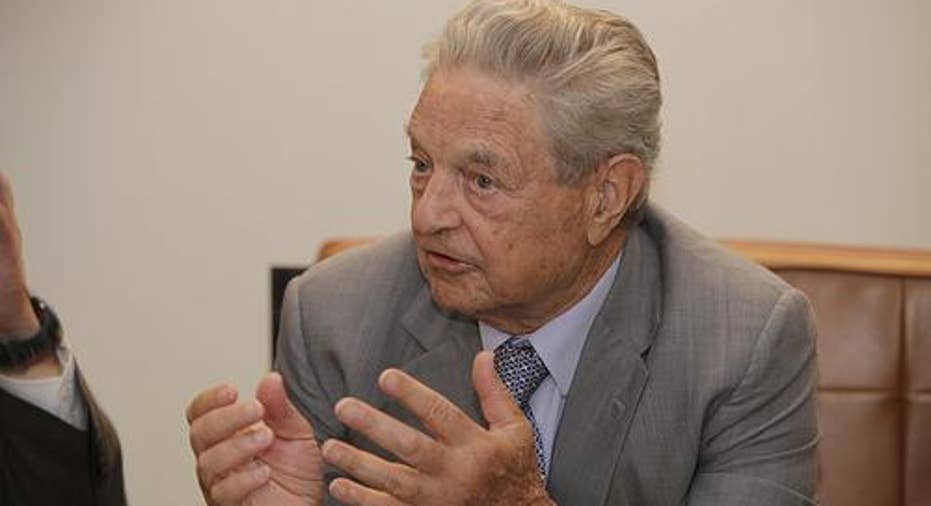A Bearish George Soros Is Trading Again

After a long hiatus, George Soros has returned to trading, lured by opportunities to profit from what he sees as coming economic troubles.
Worried about the outlook for the global economy and concerned that large market shifts may be at hand, the billionaire hedge-fund founder and philanthropist recently directed a series of big, bearish investments, according to people close to the matter.
Soros Fund Management LLC, which manages $30 billion for Mr. Soros and his family, sold stocks and bought gold and shares of gold miners, anticipating weakness in various markets. Investors view gold as a haven during times of turmoil.
The moves are a significant shift for Mr. Soros, who earned fame with a bet against the British pound in 1992, a trade that led to $1 billon of profits. In recent years, the 85-year-old billionaire has focused on public policy and philanthropy. He is also a large contributor to the super PAC backing presumptive Democratic nominee Hillary Clinton and has donated to other groups supporting Democrats.
Mr. Soros has always closely monitored his firm's investments. In the past, some senior executives bristled at how he sometimes inserted himself into the firm's operations, usually after the fund suffered losses, according to people familiar with the matter. In recent years, he hasn't done as much investing of his own. Recently, though, Mr. Soros has been spending more time in the office directing trades. He has also been in more frequent contact with the executives, the people said.
In some ways, Mr. Soros is stepping into a void at his firm. Last year, Scott Bessent, who served as Soros's top investor and has a background in macro investing, or anticipating macroeconomic moves around the globe, left the firm to start his own hedge fund. Soros has invested $2 billion with Mr. Bessent's firm, Key Square Group.
Later in 2015, Mr. Soros tapped Ted Burdick as his chief investment officer. Mr. Burdick has a background in distressed debt, arbitrage and other types of trading, rather than macro investing, Mr. Soros's lifelong specialty. That is why Mr. Soros felt comfortable stepping back in, the people said.
Mr. Soros's recent hands-on approach reflects a gloomier outlook than many. His worldview darkened over the past six months as economic and political issues in China, Europe and elsewhere have become more intractable. While the U.S. stock market has inched back toward records after troubles early this year and Chinese markets have stabilized, Mr. Soros said he remains skeptical of the Chinese economy, which is slowing.
The fallout from any unwinding of Chinese investments likely will have global implications, Mr. Soros said.
"China continues to suffer from capital flight and has been depleting its foreign currency reserves while other Asian countries have been accumulating foreign currency," Mr. Soros said in an email. "China is facing internal conflict within its political leadership, and over the coming year this will complicate its ability to deal with financial issues."
Mr. Soros worries that new troubles will arise in China partly because he said the nation doesn't seem willing to embrace a transparent political system that he contends is necessary to enact lasting economic overhauls. Beijing has embarked on overhauls in the past year but has backtracked on some efforts amid turbulent markets.
Some investors are beginning to anticipate rising inflation amid recent wage gains in the U.S., but Mr. Soros said he is more concerned that continued weakness in China will exert deflationary pressure -- a damaging spiral of falling wages and prices -- on the U.S. and global economies.
Mr. Soros also argues that there remains a good chance the European Union will collapse under the weight of the migration crisis, continuing challenges in Greece and a potential exit by the United Kingdom from the EU.
"If Britain leaves, it could unleash a general exodus, and the disintegration of the European Union will become practically unavoidable, " he said. Still, Mr. Soros said recent strength in the British pound is a sign that a vote to exit the EU is less likely.
"I'm confident that as we get closer to the Brexit vote, the 'remain' camp is getting stronger," Mr. Soros said. "Markets are not always right, but in this case I agree with them."
Other big investors also have become concerned about markets. Last month, billionaire trader Stanley Druckenmiller warned that "the bull market is exhausting itself" and hedge-fund manager Leon Cooperman said "the bubble is in fixed income," though he was sanguine on stocks.
Mr. Soros's bearish investments have had mixed success. His firm bought over 19 million shares of Barrick Gold Corp. in the first quarter, according to securities filings, making it the firm's largest stockholding at the end of the quarter. That position has gained more than $90 million since the end of the first quarter. Soros Fund Management also bought a million shares of miner Silver Wheaton Corp. in the first quarter, a position that has increased 28% so far in the second quarter.
Meanwhile, gold has climbed 19% this year.
But Mr. Soros also adopted bearish derivative positions that serve as wagers against U.S. stocks. It isn't clear when those positions were placed and at what levels during the first quarter, but the S&P 500 index has climbed 3% since the beginning of the second period, suggesting Mr. Soros could be facing losses on some of those moves.
Overall, the Soros fund is up a bit this year, in line with most macro hedge funds, according to people close to the matter. The investments by the firm were previously disclosed in filings, but it wasn't clear how involved Mr. Soros was in the decisions spurring the moves.
The last time Mr. Soros became closely involved in his firm's trading: 2007, when he became worried about housing and placed bearish wagers over two years that netted more than $1 billion of gains.
Write to Gregory Zuckerman at gregory.zuckerman@wsj.com



















